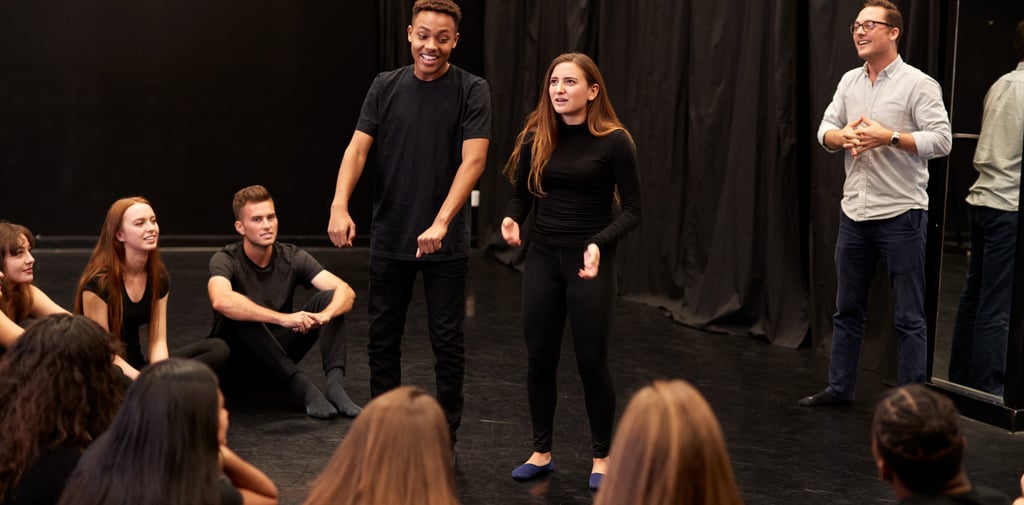5 Quick and Easy Drama Acting Warm-Up Games (Even When I’m Short on Time)
In this post, I share the reasons I've learned to start drama class and rehearsals with Acting Warm-Up Games even when we're short on time. I also share some of my favorite warm-ups!
Katie Zakkak
7/4/20253 min read


I’ll be honest, as a director, I’ve definitely had those days where I’m tempted to skip the warm-up and dive right into the scene work. There’s so much to do, and warm-ups can feel like they’re eating up valuable time. And, yes, I've been guilty of giving in to that temptation.
But over the years, I’ve learned this simple truth:
👉 When I commit to starting rehearsal or class with a focused, connected warm-up, everything runs smoother. Students are more engaged, more focused, and more prepared to jump into meaningful work.
Just like athletes stretch and activate their muscles before a big game, actors need to warm up their bodies, voices, and minds before jumping into the emotional and physical demands of theater.
🎭 Why Warm-Ups Matter
They set the tone for the work ahead
They help actors shed distractions from the day
They prepare both the body and the voice
They build trust and ensemble energy
They can be tailored to support specific rehearsal goals
Types of Acting Warm-Ups I Use Regularly
To make warm-ups effective and intentional, I like to match the warm-up to the focus of the day. Here are a few types I rotate through regularly:
1. Physical Warm-Ups
These are the actor's version of stretching and jogging laps. They help students:
Loosen up tension
Increase body awareness
Prepare for physical movement and character embodiment
Examples:
Stretching + breathing combinations
Whole-body shaking followed by slow control
Circle sound/movement combos to engage voice and body
🗣 Pro tip: I like to combine sound and movement to wake up the full performer—not just the limbs!
2. Partner Warm-Ups
Partner exercises encourage listening, responsiveness, and ensemble connection. One of the best-known examples is Mirror Mirror, where one partner leads subtle movements and the other follows, creating the illusion of perfect synchronization.
Other partner ideas:
Word tosses (one-word-at-a-time storytelling)
Emotional echo (mimicking partner’s energy or emotion)
Movement duets or call-and-response vocal games
These are especially useful early in the semester or anytime you want to rebuild connection.
3. Individual Character-Based Warm-Ups
Sometimes your students need to turn inward, especially if you're working on character development. I often use:
Relaxation + breathing meditations
Character reflection journaling
Walking in character exercises, with prompts like:
How does your character walk when they’re late?
What happens if someone they love calls their name?
These work great when you're heading into deep scene work or monologue rehearsals.
4. Full Group Warm-Ups
These are classics for a reason: they’re high energy, ensemble-building, and effective at snapping everyone into focus.
My go-tos include:
Circle games like Sound & Movement Pass
Bibbidi-Bibbidi-Bop (a fast-focus favorite)
“Pass the Clap” or “Energy Ball” to sync group attention
Use these when you need high energy and shared focus at the top of rehearsal.
5. Risk-Taking & Ensemble Trust Warm-Ups
These are the heart of ensemble building—and they go a long way in developing a group that supports each other on and off stage.
Examples:
Zip-Zap-Zop variations
Trust fall progressions
“What Are You Doing?” with improv actions
Character improv games with bold choices
These work well early in a rehearsal process, or anytime you sense the group needs a morale and connection boost.
🧰 Ready to Add More Warm-Ups to Your Toolkit?
🎁 Click here for a free warm-up game generator filled with quick and fun warm-up ideas for drama teachers and directors.
📬 10 Free Warm-up Games are also included when you join my Drama Teacher Toolkit email list, I’ll send it straight to your inbox!
You can also explore my Rehearsal Resources Bundle on TPT, which includes:
Rehearsal games
Daily rehearsal organization templates
Rehearsal schedule templates
Reflection tools for actors and crews
Final Thoughts
Even on the busiest days, warm-ups are worth it.
They center your students. They energize the room. And they remind everyone—this isn’t just practice. It’s performance preparation.
So whether it’s five minutes or fifteen, make the space.
Warm up the ensemble. Warm up the work. Warm up the art.
🎭 Happy teaching, and break a leg!



